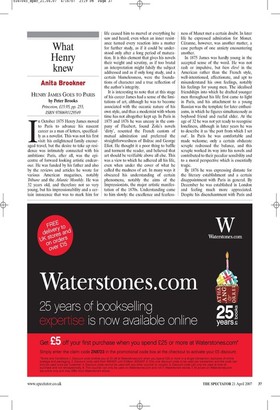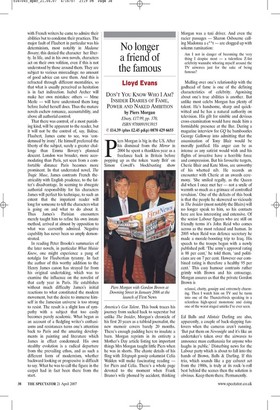What Henry knew
Anita Brookner
HENRY JAMES GOES TO PARIS by Peter Brooks Princeton, £15.95, pp. 255, ISBN 9780691129549 In October 1875 Henry James moved to Paris to advance his nascent career as a man of letters, specifically as a novelist. This was not his first visit: his enlightened family encouraged travel, but the desire to take up residence was intimately connected with his ambitions: Paris, after all, was the epicentre of forward looking artistic endeavour. He was funded by his father and also by the reviews and articles he wrote for various American magazines, notably Tribune and the Atlantic Monthly. He was 32 years old, and therefore not so very young, but his impressionability and a certain innocence that was to mark him for life caused him to marvel at everything he saw and heard, even when an inner resistance turned every reaction into a matter for further study, as if it could be understood only after a long period of maturation. It is this element that gives his novels their weight and scrutiny, as if too brutal an interpretation might falsify the subject addressed and as if only long study, and a certain blamelessness, were the foundations of character and a true reflection of the author’s integrity.
It is interesting to note that at this stage of his career James had a sense of the limitations of art, although he was to become associated with the oceanic nature of his own style, and thus a modernist with whom time has not altogether kept up. In Paris in 1875 and 1876 he was uneasy in the company of Flaubert, found Zola’s novels ‘dirty’, resented the French custom of mutual admiration and preferred the straightforwardness of Balzac and George Eliot. He thought it a poor thing to baffle and torment the reader, and believed that art should be verifiable above all else. This was a view to which he adhered all his life, even when under the cover of what he called the madness of art. In many ways it obscured his understanding of certain phenomena, notably the aims of the Impressionists, the major artistic manifestation of the 1870s. Understanding came to him slowly: the excellence and fearless ness of Manet met a certain doubt. In later life he expressed admiration for Monet. Cézanne, however, was another matter, a case perhaps of one anxiety encountering another.
In 1875 James was hardly young in the accepted sense of the word. He was not rash or impulsive, but bien élevé in the American rather than the French style, well-intentioned, affectionate, and apt to misunderstand his own feelings, notably his feelings for young men. The idealised friendships into which he drafted younger men throughout his life first came to light in Paris, and his attachment to a young Russian was the template for later enthusiasms, in which he figures simultaneously as boyhood friend and rueful elder. At the age of 32 he was not yet ready to recognise loneliness, although in later years he was to describe it as ‘the port from which I set out’. In Paris he was comfortable and made welcome; only a certain obdurate scruple redressed the balance, and this scruple worked its way into his novels and contributed to their peculiar sensibility and to a moral perspective which is essentially tragic.
By 1876 he was expressing distaste for the literary establishment and a certain disappointment with Paris in general. By December he was established in London and feeling much more appreciated. Despite his disenchantment with Paris and with French writers he came to admire their abilities but to condemn their practices. The major fault of Flaubert in particular was his determinism, most notably in Madame Bovary; this denied the character her liberty. In life, and in his own novels, characters act on their own volition, even if this is not understood by those around them. They are subject to various misreadings: no amount of good advice can save them. And this is refracted through different mentalities, so that what is usually perceived as hesitation is in fact indirection. Isabel Archer will make her own mistakes: others — Mme Merle — will have understood them long before Isabel herself does. Thus the mature novels eschew romance, accountability, and above all authorial control.
That there was control, of a most punishing kind, will be apparent to the reader, but it will not be the control of, say, Balzac. Flaubert, James came to see, was ‘condemned by irony’. He himself preferred the liberty of the subject, surely a greater challenge than Emma Bovary’s planned descent. London was broader, more accomodating than Paris, yet seen from a comfortable distance Paris becomes more prominent. In that underrated novel, The Tragic Muse, James contrasts French theatricality with English prudence, to the latter’s disadvantage. In seeming to abnegate authorial responsibility for his characters James will perfect his technique, to such an extent that the impatient reader will long for someone to tell the characters what is going on and what to do about it. Thus James’s Parisian encounters merely taught him to refine his own innate method, arrived at almost by opposition to what was currently admired. Negative capability has never been so amply demonstrated.
In reading Peter Brooks’s summaries of the later novels, in particular What Maisie Knew, one might experience a pang of notalgia for Flaubertian tyranny. In fact the author of this worthy addition to the Henry James canon has strayed far from his original undertaking, which was to examine the influence on the novelist of that early year in Paris. He establishes without much difficulty James’s initial reactions to what constituted the modern movement, but the desire to immerse himself in the Jamesian universe is too strong to resist. The result is a slight loss of sympathy with a subject that too easily becomes purely academic. What began as an account of a fledgling writer’s enthusiasms and resistances turns one’s attention back to Paris and the amazing developments in painting and literature which James in effect condemned. His own stealthy evolution is a radical departure from the prevailing ethos, and as such a different form of modernism, whether backward looking or progressive is difficult to say. What he was to call the figure in the carpet had in fact been there from the start.



















































































 Previous page
Previous page